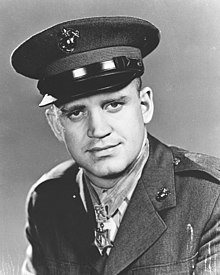Raymond G. Murphy
Captain Raymond Gerald "Jerry" Murphy (January 14, 1930 – April 6, 2007) was the 39th United States Marine to receive the Medal of Honor for heroism in the Korean War. He was decorated by President Dwight D. Eisenhower in a White House ceremony on October 27, 1953.

Quotes
edit2000s
editBeyond Glory (2003) interview
edit- Note: Edited interview transcript featured in Beyond Glory: Medal of Honor Heroes in their Own Words (2003) by Larry Smith, New York: W.W. Norton & Company, hardcover, pages 184-194.
- I don't know how many I saved. It's hard to be strong on details of what happened that day. I don't recall shooting two guys with a pistol, like the citation says. People ask me, but it was a confusing time. It really was. To get the Medal you have to have three nominees, witnesses. If they said that's what I did, I'm not one to argue with them. I've only known one recipient in our [Medal of Honor] Society who told me many years ago he wasn't scared and he knew what he was doing in his combat action. Well, most of the people around me at that time and after say that's a bunch of bullshit. You don't get in the infantry and not be scared.
- p. 190
- I just don't remember. I'll tell you one thing I remember: When it got close to the end of the day, I told somebody in my company we were going back up one more time, and I found a whole four-man machine-gun crew, all of them dead. So we started lifting them up, dragging them, trying to get them off as fast as we could. Marines don't leave their dead. That was our way. We had to get them out. I don't know what the hell they were killed by. I didn't get a chance to follow up. Anyway, I was pulling a guy by his shoulders, over rocks and through brushes and stuff, and all of a sudden I look down at what I'm pulling, and he's naked. His pants were ripped from shell fire and then got torn off as I dragged him. And I thought, "Shit, even in dying up here you can't have any privacy." There was no dignity in death. You could see the enemy. They were going around, dodging behind bushes and stuff, hiding. I lost every weapon I had. I lost my .45. I lost my carbine. I had at least one M-1 that I lost. I would pick these guns up and use them on the way up and then, when you're busy getting a stretcher or moving wounded, you shitcan your weapon. I ended up the whole day not only hauling stretchers, but with a BAR, a Browning Automatic Rifle. I don't know how that happened.
- p. 190-191
- I recently found out- my son came across this book in the library- that one of my favorite baseball players was flying suppor for us that day, and he got hit by small-arms fire and crash-landed on his way back to the base. His name was Ted Williams.
Back when I was in officer school in Quantico, Virginia, a friend from Pueblo and I went and saw his team, the Red Sox, play the Senators [now the Minnesota Twins] in Washington, and he didn't hit a ball out of the infield, and I remember thinking, 'Shit, I'll never see that man again.' Well then, when I got to Natrick, Williams- maybe the greatest hitter who ever lived- had come back. He got out of the military, rejoined the Red Sox, and I got an opportunity to see him play about six more times. I even saw his final game, when he left after hitting that last home run. He was the only Major Leaguer I know of that got called back for Korea. I heard after Ungok we lost a tank commander and we lost another officer who was flying close air support. I didn't know that was Ted Williams. He had to crash-land going back to base because the controls of his Corsair had been shot up. He was a big hero of mine.- p. 193-194